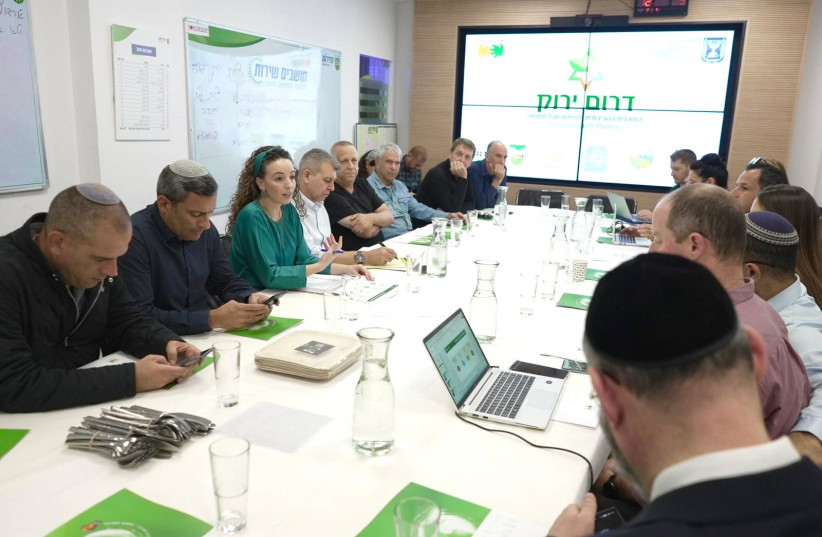After the conclusion of the Israel-Hamas conflict and the return of residents to their homes in southern and northern Israel, the global temperature will continue to rise, and Israel will still be obligated to play its part in environmental efforts, contributing to the collective goal of a cleaner world.
Climate experts and advocates conveyed this message on Monday during a virtual event led by Tel Aviv University and other organizations dedicated to addressing climate concerns. They also reviewed the decisions made at COP28 and discussed their implications for Israel.
Gideon Behar, the Foreign Ministry's special envoy for climate change and sustainability, identified five operational principles that resulted from COP28.
Principles to operate on
The first was an acknowledgment of the global climate emergency that the world is experiencing. Behar said the world has already warmed almost 1.4 degrees Celsius and is nearing the 1.5 degrees Celsius threshold. As such, "there is an urgent need to scale up our efforts."
Second was the need to transition from fossil fuels in energy systems to zero emissions by 2050, a phrase put into the main conference resolution for the first time. However, Ayelet Rosen of the Ministry of Environmental Protection said the resolution on fossil fuels "falls short" and was "watered down." Instead of talking about "shall" or "should," it is "called" on, she said. It also discusses a "phase down," not a "phase out."
The third principle was the goal of tripling renewable energies and the doubling of energy efficiency by 2040. Fourth, establishing a more robust Loss and Damage fund, which Behar said is "very important for developing countries."
The last principle was to establish a global warning mechanism for climate disasters by 2027.

What do these newly established principles mean for Israel?
According to Behar, there are six steps that Israel will now have to take to be in line with the decisions adopted at COP.
First, the country must update its Nationally Determined Contribution (NDC) climate action plan to cut emissions and adapt to climate impacts; a new plan must be submitted to the United Nations by 2025. Such a plan, said Behar, will require the work of multiple ministries and all sectors.
Second, Israel must prepare a strategic plan to become net zero by the middle of the century. Next, the country will have to accelerate the adaptation process and build resilience in Israel.
"The climate crisis is here, and it is a danger for Israel, so we must accelerate our efforts for issues like food security, heatwaves, etc," Behar said.
Fourth: Positioning Israel as a world leader in climate innovation.
According to a report published recently by the Israel Innovation Authority and PLANETech, around 800 startups are dealing with climate change in Israel, and one out of six established last year was in this field.
There were three leading climate technologies highlighted at COP28, according to climate activist and entrepreneur Yosef Abramowitz: nuclear, green hydrogen, and carbon capture and storage.
"Israel has huge potential, and this can be an engine of growth for Israel and an engine for improving our image worldwide," Behar said. However, Abramowitz cautioned that when much of the latest climate technology is economically viable, it will likely be too late to help the world achieve its environmental goals.
Next, cooperation should be increased to build regional climate resilience in the Eastern Mediterranean basin, Behar said.
Finally, the next COP – COP29 – will be held in Azerbaijan in November 2024, and Behar said, "We have to prepare ourselves."
COP resolutions are nonbinding. But, they can give Israel benchmarks for national change, explained Dov Khenin, chairman of the President's Climate Forum.
Abramowitz was less optimistic.
Will Israel be able to achieve its goals?
He said that if Israel wanted to achieve its goal of 50% renewables in an economically efficient way that promotes jobs and brings climate justice and energy security, he could come up with five ways, but Israel is just not motivated.
"All of this will only happen if [Hassan Nasrallah] blows up the Leviathan gas field," Abramowitz said smugly. Nasrallah is the leader of Hezbollah, and the Leviathan is located in the eastern Mediterranean Sea.
"There is zero political will in the State of Israel" for climate initiatives, Abramowitz said,
Tamar Gannot Rosenstreich of the Adam Teva V'Din NGO expressed similar sentiments – about Israel and the world. She said that if the environmental community was celebrating that the words "fossil fuels" made it into a COP28 resolution, "then we have already given up."
She said that if the world is lagging in reaching its climate goals, "Israel is lagging even more behind" and that "climate is still not considered a strategic issue in Israel.
"We need to understand that climate change is an amplifier to all our other threats, security and economic," Grannot continued. She said that "when the country puts in place climate-forward policies," citizens' lives will improve simultaneously.
"We need to put laws and money behind our words."
